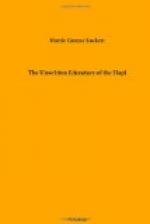=The Myth, Its Meaning and Function in Primitive Life=
As a background for our discussion we shall need to consider first, the nature and significance of mythology, since there is some, indeed much, difference of opinion on the subject, and to arrive at some basis of understanding as to its function.
The so-called school of Nature-Mythology, which flourishes mainly in Germany, maintains that primitive man is highly interested in natural phenomena, and that this interest is essentially of a theoretic, contemplative and poetical character. To writers of this school every myth has as its kernel or essence some natural phenomenon or other, even though such idea is not apparent upon the surface of the story; a deeper meaning, a symbolic reference, being insisted upon. Such famous scholars as Ehrenreich, Siecke, Winckler, Max Muller, and Kuhn have long given us this interpretation of myth.
In strong contrast to this theory which regards myth as naturalistic, symbolic, and imaginary, we have the theory which holds a sacred tale as a true historical record of the past. This idea is supported by the so-called Historical school in Germany and America, and represented in England by Dr. Rivers. We must admit that both history and natural environment have left a profound imprint on all cultural achievement, including mythology, but we are not justified in regarding all mythology as historical chronicle, nor yet as the poetical musings of primitive naturalists. The primitive does indeed put something of historical record and something of his best interpretation of mysterious natural phenomena into his legendary lore, but there is something else, we are led to believe, that takes precedence over all other considerations in the mind of the primitive (as well as in the minds of all of the rest of us) and that is getting on in the world, a pragmatic outlook.
It is evident that the primitive relies upon his ancient lore to help him out in his struggle with his environment, in his needs spiritual and his needs physical, and this immense service comes through religious ritual, moral incentive, and sociological pattern, as laid down in the cherished magical and legendary lore of his tribe.
The close connection between religion and mythology, under-estimated by many, has been fully appreciated by the great British anthropologist, Sir James Frazer, and by classical scholars like Miss Jane Harrison. The myth is the Bible of the primitive, and just as our Sacred Story lives in our ritual and in our morality, as it governs our faith and controls our conduct, even so does the savage live by his mythology.
The myth, as it actually exists in a primitive community, even today, is not of the nature of fiction such as our novel, but is a living reality, believed to have once happened in primeval times when the world was young and continuing ever since to influence the world and human destiny.




